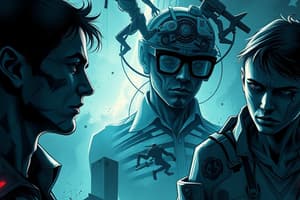Podcast
Questions and Answers
What are theories necessary for in explaining crime?
What are theories necessary for in explaining crime?
Theories provide a framework for understanding complex phenomena by identifying patterns, causes, and effects.
What is the focus of ideographic theoretical explanations?
What is the focus of ideographic theoretical explanations?
- Quantitative methods
- Detailed qualitative analysis of individual cases (correct)
- General laws across many cases
- Broad population studies
Which of the following describes nomothetic theoretical explanations?
Which of the following describes nomothetic theoretical explanations?
- Qualitative methods
- Focus on individual case details
- Identifying general laws and patterns (correct)
- Examining personal experiences
What are the building blocks of theory in criminology?
What are the building blocks of theory in criminology?
What is one characteristic of a good theory related to testability?
What is one characteristic of a good theory related to testability?
A good theory should have unnecessary complexity according to the principle of parsimony.
A good theory should have unnecessary complexity according to the principle of parsimony.
How are theories built?
How are theories built?
Flashcards are hidden until you start studying
Study Notes
Purpose of Module
- The module aims to critically engage with theories explaining and addressing crimes of different natures.
Learning Outcomes
- The module will explore the nature of good theory and evaluate existing theories.
- Students will learn to integrate and apply these theories in new ways.
Importance of Theories in Explaining Crime
- Theories are systematic explanations for phenomena
- They consist of principles and propositions that describe relationships.
- They provide frameworks for understanding complex phenomena by identifying patterns, causes, and effects.
Ideographic and Nomothetic Theoretical Explanations
- Ideographic explanations: Focus on detailed, qualitative analysis of individual cases to understand specific contexts and complexities.
- Nomothetic explanations: Aim to identify general laws and patterns across many cases using quantitative methods.
Building Blocks of Theory
- Theoretical Framework: An organized structure that integrates concepts, constructs, propositions, and hypotheses.
- Constructs: Complex, higher-order concepts created to explain relationships between more basic concepts.
- Concepts: Fundamental units of a theory representing abstract ideas or phenomena.
- Propositions: Statements that describe relationships between concepts or constructs within a theory.
- Hypotheses: Specific, testable predictions derived from a theory.
Characteristics of a Good Theory
- Testability: A good theory should be testable and falsifiable, making predictions that can be empirically tested and potentially proven wrong.
- Parsimony: The theory should be simple, avoiding unnecessary complexity.
- Predictive Power: A good theory should be able to predict future occurrences or behaviors accurately.
How Theories Are Built
- Theories are built through a structured process beginning with the identification of a research problem, followed by a review of existing literature and the development of hypotheses.
Studying That Suits You
Use AI to generate personalized quizzes and flashcards to suit your learning preferences.




